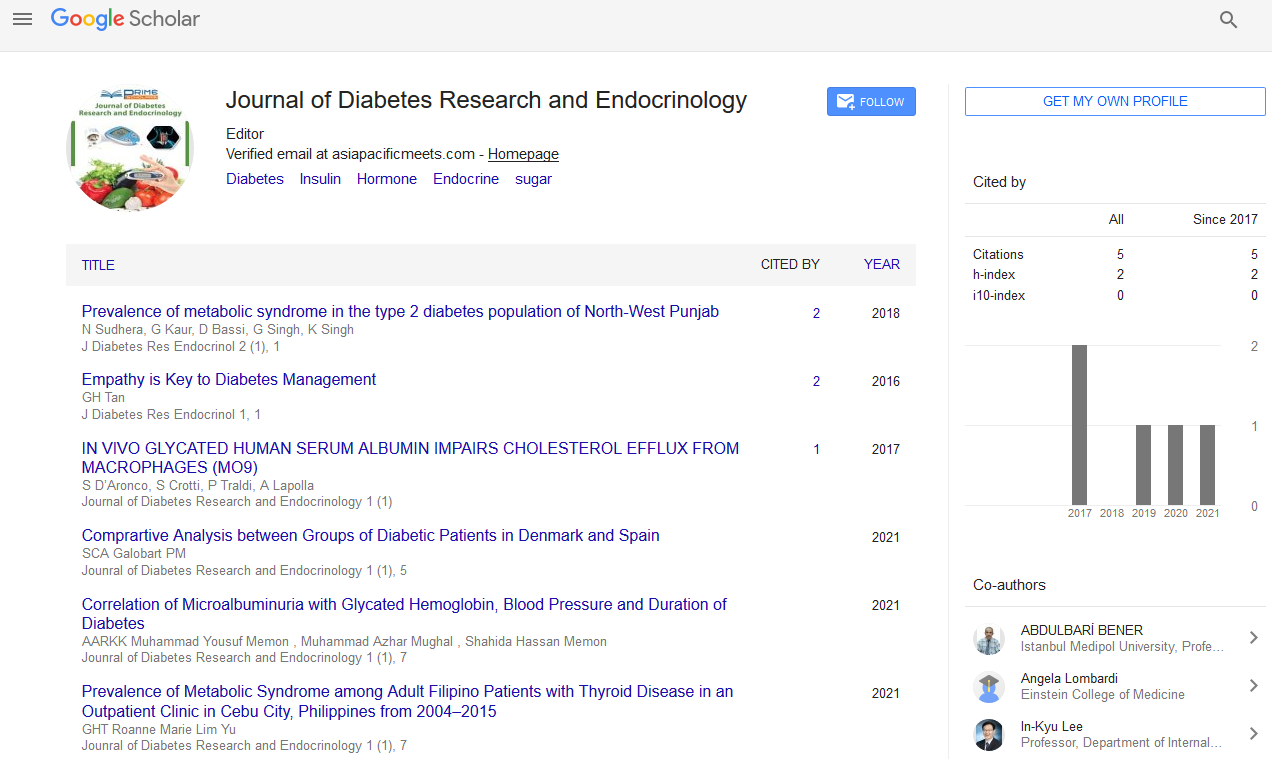Commentary - (2024) Volume 8, Issue 3
Understanding Hypoglycemia: Causes, Symptoms, and Management
Ming Zhang*
Department of Diabetes, Yale University, USA
*Correspondence:
Ming Zhang,
Department of Diabetes, Yale University,
USA,
Email:
Received: 02-Sep-2024, Manuscript No. PJDRE-24-21873;
Editor assigned: 04-Sep-2024, Pre QC No. IPJDRE-24-21873 (PQ);
Reviewed: 18-Sep-2024, QC No. IPJDRE-24-21873 ;
Revised: 23-Sep-2024, Manuscript No. IPJDRE-24-21873 (R);
Published:
30-Sep-2024, DOI: 10.36648/ipjdre.08.03.29
Description
Hypoglycemia, commonly referred to as low blood sugar,
occurs when the glucose level in the bloodstream falls below
the normal range, typically below 70 mg/dL (3.9 mmol/L).
While the body requires a stable supply of glucose for energy,
particularly for the brain, hypoglycemia can lead to a range of
serious health issues if not addressed promptly. Hypoglycemia
can result from various factors, with some of the most common
causes including, Individuals with diabetes often use insulin
or other medications to lower blood sugar. Taking too much
insulin, skipping meals, or exercising more than usual can
trigger hypoglycemia. Prolonged periods without food can
deplete glycogen stores, leading to low blood sugar levels.
Drinking alcohol, especially on an empty stomach, can inhibit
gluconeogenesis in the liver, resulting in lower blood glucose
levels. Conditions that affect the adrenal or pituitary glands
can lead to insufficient hormone production, impacting glucose
regulation. This occurs after eating, typically following a highcarbohydrate
meal. The body releases an excessive amount of
insulin, leading to a rapid drop in blood sugar. Some medications,
including those used to treat diabetes, can cause hypoglycemia
as a side effect. Recognizing the symptoms of hypoglycemia is
critical for timely intervention. Symptoms can vary in severity
and may include: Shakiness, sweating, anxiety, dizziness, and
irritability. Confusion, weakness, difficulty concentrating, and
increased heart rate. Seizures, loss of consciousness, and
in extreme cases, coma. Early recognition and treatment of
hypoglycemia are crucial, as prolonged low blood sugar can
lead to more severe neurological complications. Managing
hypoglycemia involves both immediate treatment and longterm
strategies. If someone is experiencing hypoglycemia,
consuming fast-acting carbohydrates is essential. This can
include Glucose tablets or gel, A half-cup of fruit juice or
regular soda, A tablespoon of honey or sugar. Following the
intake of carbohydrates, it’s important to recheck blood sugar
levels after 15 minutes and consume additional carbohydrates
if levels remain low. For individuals with diabetes, adjusting
medication dosages, planning regular meals, and monitoring
blood sugar levels can help prevent episodes of hypoglycemia.
It’s crucial for individuals at risk to carry a source of fast-acting
carbohydrates at all times and wear a medical alert bracelet
to inform others of their condition in case of an emergency.
Educating friends and family about recognizing symptoms
and how to respond is also beneficial. Eating balanced meals
that include complex carbohydrates, proteins, and healthy
fats can help stabilize blood sugar levels. Frequent, small
meals may be more effective than larger, infrequent ones.
Those experiencing recurrent hypoglycemia should consult
healthcare professionals to identify underlying causes and
adjust treatment plans accordingly. Hypoglycemia is a serious
condition that requires awareness and proactive management,
particularly for individuals with diabetes. Understanding the
causes, recognizing symptoms, and implementing effective
treatment strategies can help prevent the complications
associated with low blood sugar. Education and self-monitoring
play vital roles in maintaining blood glucose levels within a
healthy range, ultimately leading to improved overall health
and well-being. By taking appropriate measures, individuals
can navigate the challenges of hypoglycemia and maintain a
balanced lifestyle.
Acknowledgement
None.
Conflict Of Interest
None.
Citation: Zhang M (2024) Understanding Hypoglycemia: Causes, Symptoms, and Management. J Diab Res Endocrinol. 8:29.
Copyright: © 2024 Zhang M. This is an open-access article distributed under the terms of the Creative Commons Attribution
License, which permits unrestricted use, distribution, and reproduction in any medium, provided the original author and source
are credited.

